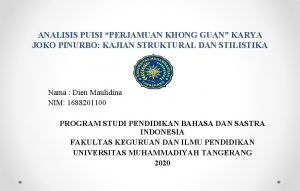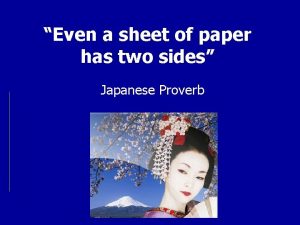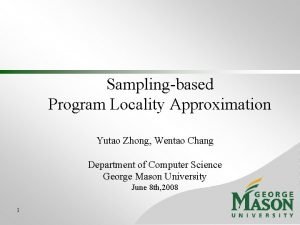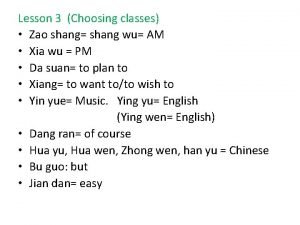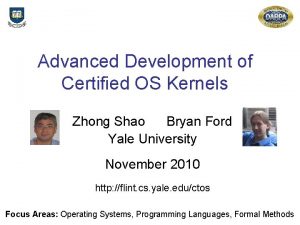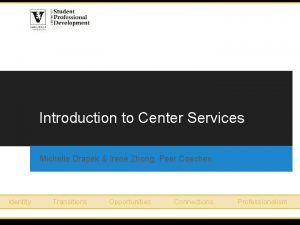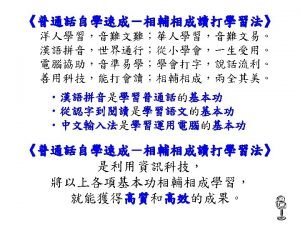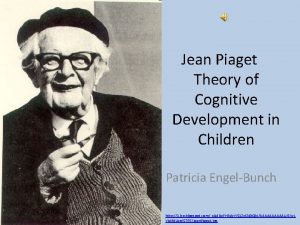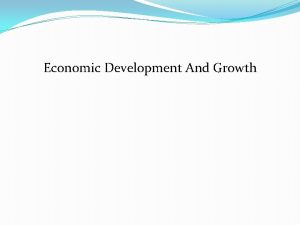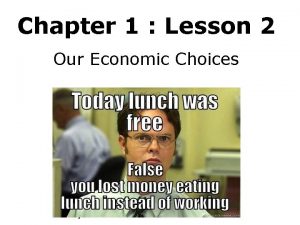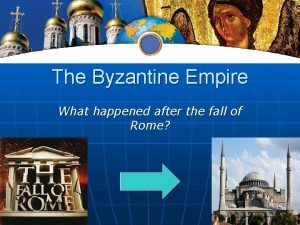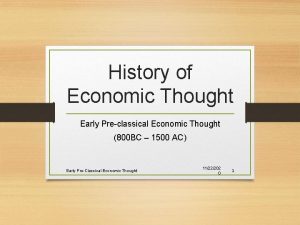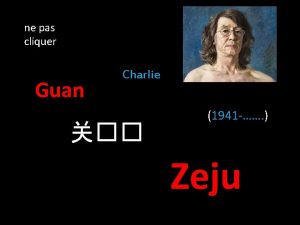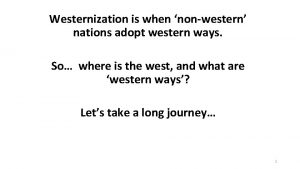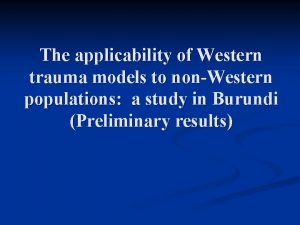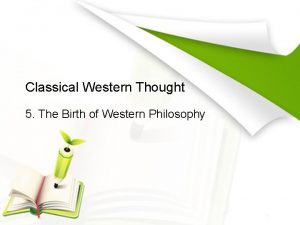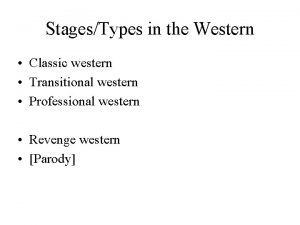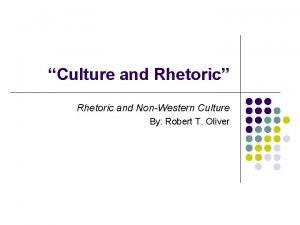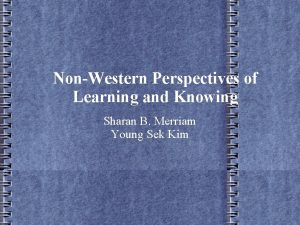Early NonWestern and Western Economic Thought Guan Zhong



























- Slides: 27

Early Non-Western and Western Economic Thought

Guan Zhong l l l 725 -645 B. C First to discuss the law of demand He argued that when a good was abundant, it became light, and its price would fall. When it was “locked away”, it became heavy, and its price would rise. There would be movements of goods into and out of markets based on their lightness or heaviness, with a definite tendency towards one price (or what we would call equilibrium)

The Greeks

Main Contributors l l l Socrates Protagoras (480 -411 B. C. ) Xenophon (427 -355 B. C) Plato (427 -327 B. C. ) Aristotle (384 -322 B. C. )

Main Concepts l l l Hedonic Calculus Subjective Value Diminishing Marginal Utility Efficiency Resource Allocation

Socrates l l Clearly a great thinker, however did not leave written word. Must of our knowledge comes from two of his students: – Xenophon – Plato

Xenophon l l l The term: Economics is attributed to Xenophon and NOT Aristotle (as some suggest) OECONOMICUS a efficient management and leadership treatise by Xenophon Main Concern: Microeconomics

OECONOMICUS l l A good manager strives to increase the size of the economic surplus of whatever unit he supervises (e. g. family, city, state) This is Accomplished by – Skill – Order – DIVISION OF LABOR l Wealth is derived from that from which profit can be derived

Xenophon and Socrates l According to Xenophon, Socrates is said to have stated that: – something can be beautiful and ugly or good and bad at the same time – What is beautiful for running is ugly for wrestling and what is beautiful for wrestling is ugly for running. • THUS THE CONCEPT OF “SUBJECTIVE UTILITY”

Plato l l A more “macro” view An Optimal State: – a rigid, static, ideal situation where any change would be “regressive” l Division of labor necessary to satisfy the many “wants”

Plato’s Concept of Society l l Specialization is the “NATURAL LAW” Justice is important for all “CITIZENS” Property allowed BUT CHECK CORRUPTION Warriors in later age become “leaders”

Aristotle l l Plato’s MUST known student Review “two-party” exchange in terms of marginal utility – Probably as review of legal system in Athens

Aristotle and Private Property l Unlike Plato, private property for all classes. – This would • increase efficiency • social peace • develop moral character

Nature of Trade l l Trade can only occur when there is a surplus There must different subjective estimates of the value of the surplus in order for trade to exist Traders must establish rapport and see the benefits of the trade There need be a dispute administrator

Money and Interest l l l Money only had one VALUE: Exchange Thus, accumulation of money of its own sake was not “natural” Thus, against interest rate

Protagoras l l Hinted a “democratic” process in the market place “means” justify the “end” – Unlike Plato who view the “end” justifying the “means”

Romans l Main Contributions were in the “empirical working” of business – Need for transportation infrastructure – Need for accurate measurements

Other Roman Contributions l Laws – Civil Law (between citizens) – Common Law (between a citizen and a noncitizen) l l l Dispute resolutions Percentage damaged in shipment Banking

Middle Ages and the Feudal System l l A mostly decentralized system (much like the polis (city-state) of Greece MAIN DIFFERENCE: – THEY UNIFY SOCIAL SCHEME UNDER THE CATHOLIC CHURCH l Church Maintained a MONOPOLY on Learning

Scholastic l The Scholastic Methodology: – Pose a Question – Lengthy discussion (at least in appearance with both sides) – Citations – Conclusion (to large extent on the “weight” of the citations

Scholastic l Scholastics had to content with four issues – Private Property – Profits – Usury

Private Property l l The Thomists took a practical stance: they argued that private property was a "conventional" human arrangement with no moral implications, and furthermore, it had the nice side-effect of stimulating economic activity and thus general welfare Thomanist, those who followed: St. Thomas Aquinas

St. Thomas Aquinas l l 1225 -1274 Goods had double measure: – value vs. – exchange

Private Property l l The Thomists cautioned that this did not mean they blankly endorsed all private enterprise: the "love of lucre", they noted, was a serious sin. They stressed the fact that man only has "stewardship" of God's property and should make property available for communal use.

Profit l l Should a merchant be allowed to profit from differentials in prices? The Scholastics replied with a qualified yes, provided the merchant is not motivated by pure gain and profit be only just enough to cover his labor expenses (sacrifices) of the merchant.

Profit l l l They went on to argue that the trader, far from being a parasite, is performing a valuable service and increasing general welfare by meeting different needs. What is the"just price" (justum pretium) of a good? They Followed the Golden Rule ("Do unto others as you would have them do un to you") "

Profit l l l The Scholastics decided that a person should not charge more for a good than what he would be willing to pay for it himself. This not only to make ethical sense but also seemed like a good way to estimate the "usefulness" of a good. If a bearskin is so useful to you that you would be willing to pay two deerskins for it, then if you own a bearskin you must sell it for two deerskins.
 Mr sze
Mr sze Allen guan
Allen guan Karen guan
Karen guan Perjamuan khong guan
Perjamuan khong guan Paper has 6 sides
Paper has 6 sides Guan chem chen
Guan chem chen Zhongwei guan
Zhongwei guan Yap kheng guan
Yap kheng guan Complete or incomplete thought?
Complete or incomplete thought? Hanshu xu uconn
Hanshu xu uconn Yutao zhong
Yutao zhong Zhong hanliang
Zhong hanliang Shang wu
Shang wu Zhong shao
Zhong shao Hao zhong
Hao zhong Irene zhong
Irene zhong Nimen hao
Nimen hao Hao zhong
Hao zhong One way function
One way function Lee zhong sheng
Lee zhong sheng 2ming2
2ming2 Tertiary circular reactions
Tertiary circular reactions Early cpr and early defibrillation can: *
Early cpr and early defibrillation can: * Political economic and social forces of management
Political economic and social forces of management Difference between economic growth and economic development
Difference between economic growth and economic development Economic growth vs economic development
Economic growth vs economic development Lesson 2 our economic choices
Lesson 2 our economic choices Eastern and western roman empire map
Eastern and western roman empire map



